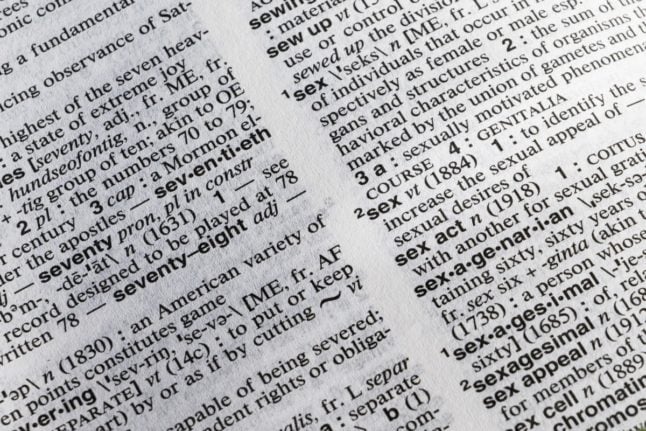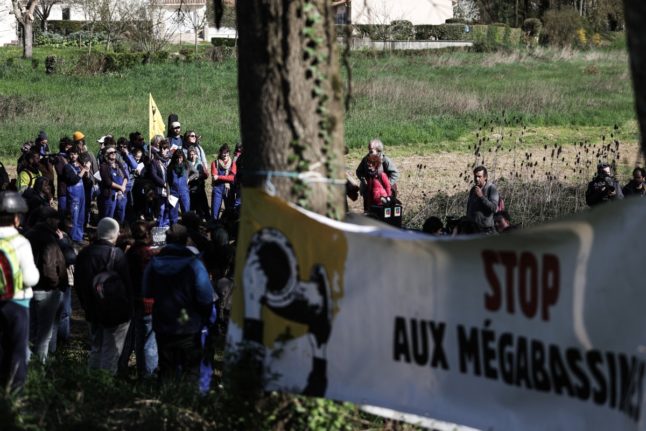The French linguist Bernard Cerquiglini is clear that the title of his book should be taken with humour and a pinch of salt, beginning his work by explaining that it is a ‘bad faith proposition’.
Clearly, the English language does exist and equally clearly the French are a little uneasy about it – with numerous laws, national bodies and local initiatives attempting to fight back against the anglicisms that now litter everyday speech, from ‘c’est cool’ to ‘un job’.
But Cerquiglini argues that the supposed ‘influx’ of English words that are now used in France, especially tech-related terms, is nothing compared to what happened when French literally invaded English in the Middle Ages.
And the close similarity that the two languages enjoy today – around 30 percent of English words are of French origin – speaks to this entwined history.
“You can also see my book as an homage to the English language, which has been able to adopt so many words… Viking, Danish, French, it’s astonishing,” he told AFP.
The history
The key date in the blending of English and French is the Norman conquest of 1066, when Duke William of Normandy invaded England with a small group of Norman knights and made himself the English king William the Conqueror.
What happened next was a radical re-ordering of society in which English nobles were displaced and William’s knights were installed as a new French-speaking (or at least Norman-speaking) ruling class.
The use of French by the ruling classes continued into the 13th and 14th centuries, by which time French was the official language of the royal courts, diplomacy, the law, administration and trade – meaning that ambitious English people had no choice but to learn French in order to take part in official or legal processes.
Cerquiglini says that half of all English’s borrowings from French took place between 1260-1400, with a heavy slant towards words related to nobility, trade, administration or the law.
But a large group of non-native speakers meant that the French spoken in England was already starting to evolve, and the French words ended up with different pronunciations or even a different meaning.
As early as 1175, the records show a Frenchman in England snootily remarking that: “My language is good, because I was born in France”.
English and French started to part ways from the mid-1400s, by which time the two countries no longer shared royalty (the last English possession in France, the port of Calais, was lost to the French in 1558) and gradually systems such as the law courts and trade began to be conducted in English.
French remained widely spoken as a second language by the nobility and the elite right up until the early 20th century and French is still the most widely-taught language in UK schools.
The similarities
It’s not always easy to distinguish between English words that have a French root and those that have a Latin root, but linguists estimate that around 29 percent of English words come from French, another 29 percent from Latin, 26 percent from German and the rest from other languages.
But many of the English words that do have a clear French root are related to nobility, administration, politics and the law.
For example the French words gouvernement, parlement, autorité and peuple are clearly recognisable to English speakers. Likewise budget, revenus, enterprise and taxe, plus avocat, cour, juge, magistrat and evidence.
Amusingly, the French and the English obviously found time to share many insults, including bâtard [bastard], crétin, imbecile, brute and stupide.
Adaptation
But most of the people in England who were speaking French did not have it as their mother tongue, so the language began to adapt. For example the French à cause de literally translates into English as ‘by cause of’ which over time became the English word ‘because’.
There are also words that started out the same but changed their meaning over time – for example the English word ‘clock’ comes from the French ‘cloche’ (bell), because in the Middle Ages church bells were the most common method of keeping track of the time for most people.
When the mechanical clock began to appear from the 14th century onwards, the French used a new term – une horloge – but the English stuck with the original.
The differences
One of the big differences between English and French is that English simply has more words – there are roughly 170,000 words in the English language, compared to about 135,000 in French.
And at least part of this comes from English being a ‘blended’ language – that English people hung on to their original words and simply added the French ones, which is why you often get several different English words that have the same translation in French eg clever and intelligent both translate into French as ‘intelligent’.
Another difference represents the class divide that the Norman invasion imposed between the French nobles and the English labourers.
For example the words pig and cow both have Anglo-Saxon roots, while pork and beef come from French (porc and boeuf) – so when the animal is in the field being looked after by English peasants it has an Anglo-Saxon name, but by the time it is on the plate being eaten by posh people, it becomes French.
There’s also a tendency in English for the more everyday words to have Anglo-Saxon origins while the fancier words have French origins – eg to build (English) versus to construct (French). In French construire is used for both. Or to feed (English) versus to nourish (French) – in French both are nourrir.
Faux amis
One consequence of English and French being so closely linked in the bane of every language-learner’s life – les faux amis (false friends).
These are words that look and sound very similar, but have a completely different meaning. If you don’t know the French word for something you can have a stab at saying the English word with a French pronunciation – and often you will be right.
But sometimes you will be wrong, and sometimes it will be embarrassing.
READ ALSO The 18 most embarrassing French ‘false friends’
Often, faux amis are words that have changed their meaning in one language but not the other – for example the French word sensible means sensitive, not sensible – which is why you can buy products for peau sensible (sensitive skin).
But it once meant sensitive in English too – for example in the title of Jane Austen’s novel Sense and Sensibility – over time the meaning of the English word adapted but the French one stayed the same.
The title
And a word on that title – La langue anglaise n’existe pas, C’est du français mal prononcé (the English language does not exist, it’s just badly pronounced French) is actually a quote from former French prime minister Georges Clemenceau.
He did apparently speak English, but doesn’t appear to have been very fond of England itself – his other well-known quote on the topic is: “L’Angleterre n’est qu’une colonie française qui a mal tourné” – England is just a French colony gone wrong.



 Please whitelist us to continue reading.
Please whitelist us to continue reading.
Member comments